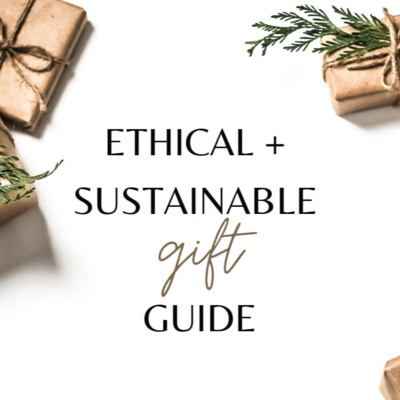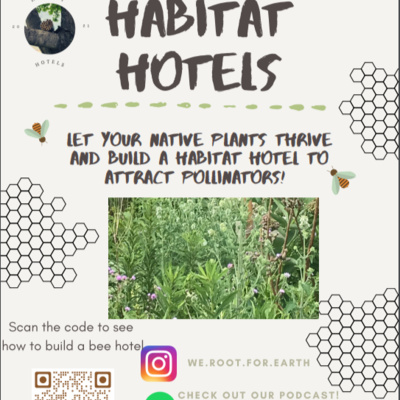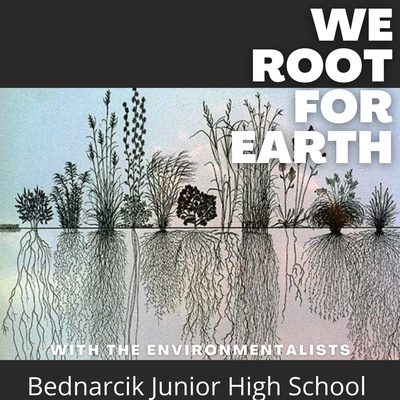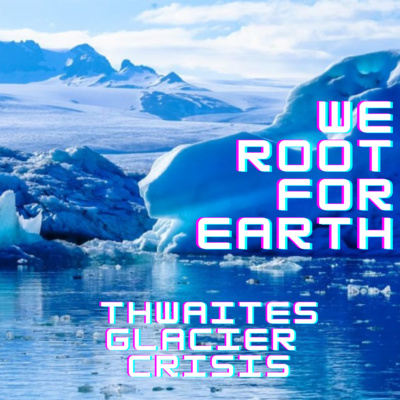Discover We Root for Earth
We Root for Earth

We Root for Earth
Author: The Environmentalists
Subscribed: 0Played: 1Subscribe
Share
© The Environmentalists
Description
A student podcast designed to educate others on the small changes we all can do to help protect Earth's valuable resources in a sustainable way. The podcast is run by The Environmentalists, a middle school club. You can subscribe to our podcast newsletter and learm more about out projects at https://werootforearth732232767.wordpress.com/home/. Interested in learning more about our projects, leave us a voice message: anchor.fm/the-environmentalists/message
30 Episodes
Reverse
In this episode we share our experience with monitoring river water quality and we provide reminders on having a sustainable Thanksgiving. We are so happy to be restarting our club podcast We Root for Earth with our newest members. The Environmentalist are 6th, 7th and 8th graders who care deply about protecting our environment and making a difference in our community. Join us on our mission to improve the environment!
Happy Thanksgiving!
ReduceFoodWasteThisThanksgiving
Learn about the consumer waste typically produced on this holiday and what you can do differently. Be an original gift giver and make your valentine feel special. Check out all the great ideas we found to have a Valentine's Day that shows love to the Earth too.
Here are two of our favorite ideas:
The “Slow Flowers” movement encourages people to buy in-season flowers from small, local growers in the United States and Canada. Instead of roses, you’ll find early-season blooms like tulips, lilac, and hyacinth, grown in protective greenhouse environments to ensure they’re looking their best and brightest.
The Canopy Project, is a tree-planting campaign, to offer your loved one a bouquet of trees this Valentine’s Day.
#sustainablegifts #sustainablevalentine #lovetheearth
This guide was made by our environmentalists to provide you with great gift ideas that are not only good for anyone in your life but also sustainable.
Check out the following companies mentioned in the podcast.
Larq Water Bottle
4ocean Ocean Trash Bracelets
Zero Waste Starter Kit Kits are set up fby interest such as pet owner, cook, etc. They also have some great ways to wrap gifts in a eco-friendly way
Pela Phone Cases
Reveal Speaker - bamboo solar powered speaker
Better Beauty
United by Blue
Habitat Hotels
We are thrilled to begin our third season with a new group of students. We have been busy working on two projects which we hope will inspire you to get involved with environmental issues. You are welcome to compete against us in The Purple Plow Challenge. Check out their webpage for information about the project. We Root for Earth!
After months of planning, our project is finally happening! Hear about our first Habitat Hotels workshop which was a great success. This workshop taught families the importance of pollinators, why non agressive bees need homes and how to build them. The workshop was made possible by the support of our local library and by the grant money provided from EarthEcho International as part of our 2nd place win in the OurEcho Biodiversity Challenge.
This is the last podcast for our first season but dont worry, we will be back in June to start season two.
We hope you try one of our ideas for making Earth Day a meaningful day for you and your family. If you are in the Aurora area, we are hosting an Earth Day cleanup on April 24 at Bednarcik Junior High School and would love for you to join us. If you have any questions contact us at bednarcikenvironmentalists@gmail.com
In this episode hear from our team of students who tried a plant based diet for the first time. Check out our blog posts on Instagram We Root for Earth or lookg at the recipes we tried on our website.
World Water Day, held on 22 March every year since 1993, celebrates water and raises awareness of the 2 billion people living without access to safe water. Students are learning about human impact on our natural resources as they investigate communities around the globe facing a water crisis. As they put together proposals on how to fix these problems, students are tracking their water use and many have made a commitment to reducing water use. These are their stories of what they hope to change.
In this episode learn more about the Sustainability Challenge and hear how we are staying on track. So far, we have successfully completed 15 out of 15 tasks. We have found this challenge to be rewarding and we have enjoyed sharing our daily progress on our Instagram We Root for Earth. Check it out and see what we have accomplished. This week we are also joined by special guests Sammie and Harper who share some things they have learned that can help reduce our human impact on the environment.
Let’s be honest — you’re probably like most people who have already given up on their New Year's resolution. Why not start something new that could have a more lasting impact? Join us on our journey to be more sustainable. In this week's episode, learn small habits you can easily change that can make a big impact on the environment. We are excited to have a special segment this week with our guest speaker, Autumn, who will tell us what she learned about e-waste and recycling batteries during a school project.
Welcome back to We Root for Earth! We are a group that is dedicated to helping restore our environment. We’d also love it if you would come on this journey with us and as we try new things to help mend our environment.
This podcast discusses the Thwaites Glacier, a glacier that scientists call the doomsday glacier.
Here are some ways to reduce your C02 Emissions and save the Thwaites Glacier:
Take showers instead of baths
Use a reusable water bottle
Keep windows and blinds closed
Turn off your lights when you’re not using them
Use cold water when washing your clothes
Use your dishwasher rather than hand washing dishes
Try carpooling or walking/biking in substitute for cars
Refraining from using single-use plastics
Taking a walk with gloves and a trash bag to clean up your neighborhood
Sources Used:
https://www.earthreminder.com/how-to-prevent-glaciers-from-melting/ (Earth reminder)
https://www.bbc.com/news/science-environment-59644494 (BBC News)
Along with festive celebrations and resolutions come opportunities to be friendlier to the environment this new year.
Choose at least one simple lifestyle change to start. Every little bit adds up to make a difference.
Sources Used:
(NEEF) Climate Superstars Lesson Plans on Global Climate Change
(NASA) https://climate.nasa.gov/ask-nasa-climate/3119/climate-change-mission-control/
(Go Load Up) https://goloadup.com/eco-friendly-new-years-resolutions/
(Wren) https://www.wren.co/ Learn how to measure and contraol your carbon footpring and offset your carbon footprint by supporting projects you care about.
(Earth 911) https://search.earth911.com/
Homemade gifts and life experiences are personalized gifts that come from the heart. Try giving these types of gifts this year. If you are not creative or not sure what someone would like, before you buy lotion, candles or soaps, consider using a small business in your community or look for environentally sustainable companies.
Check out some of these business for environmentally friendly gift ideas.
Made Trade
By the Sea Necklaces
Cozy Crackling Candles
ELF
Grove
Green Coast Glitter
Amazon
The Spruce Eats
Lush
Socks that Plant Trees
We were inspired by the following websites and social media accounts: Plastic Free July, Olivia for the Ocean, My Green Closet, Good Housekeeping
In this episode we discuss the impact holiday celebrations have on the environment and provide some helpful tips and strategies to reduce waste during this time.
Resources used for this podcast:
National Environmental Education Foundation (NEEF)
Stanford University Recycling Center
Seaside Sustainablity
Happy Thanksgiving! This podcast is about simple ways you can celebrate a wastefree Thanksgiving.
Here are some eco-friendly tips:
Go natural. Decorate with nature. Bring pine branches, pinecones, acorns, and colorful leaves into your home. It will add fragrant beauty to your table. And after the holiday, these decorations can all be returned to nature.
Shop locally. Try shopping at a farmer's market near you. Local foods require fewer greenhouse gases to get to you, and are usually grown on smaller farms using more sustainable practices.
Reduce food waste. Tons of food will be scraped into the garbage this Thanksgiving. Start with smaller portions to reduce this waste.
Repurpose. One of the best parts of Thanksgiving dinner is the leftovers. Store in reusable containers with reusable lids, and try making a delicious stock for soups, chilis and stews with what is left of the turkey.
Recycle. The aluminum trays used for baking the turkey (if you use one) are recyclable. Cleaning these pans can be a bit of a chore, but it’s a big piece of aluminum worth recycling.
Check out our new podcast and hear about our experience on World Water Monitoring Day.
It is the start of a new school year, so this episode is an introduction to some new members and just a conversation between us about the environmental issues that matter to us.
Todays episode is a continuation to Episode 6: The Prairie State? We share some ideas on what can be done to help restore the prairie and at the end of the episode we share some exciting news.
Join us as we learn about the habitats around our school in Northeastern Illinois. This is Part 1 of 2 in a series talking about our new project Habitat Hotels, our plan to increase the pollinator population.
In this episode we hear personal testimony from a school administrator who took our suggestion to try using bar shampoo and conditioner as a way to reduce single use plastic.















